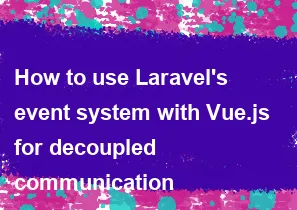How to use Laravel's event system with Vue.js for decoupled communication

Using Laravel's event system in conjunction with Vue.js can provide a powerful and decoupled communication mechanism between your server-side and client-side code. Laravel's event system allows you to broadcast events from the server, and Vue.js can then listen for these events on the client side. Here's a step-by-step guide on how you can achieve this:
1. Install Laravel Echo and Pusher
First, make sure you have Laravel Echo and Pusher installed. Laravel Echo is a JavaScript library that makes it easy to subscribe to channels and listen for events broadcast by Laravel. Pusher is a popular real-time messaging service.
bashcomposer require pusher/pusher-php-server npm install --save laravel-echo pusher-js
2. Set up Pusher
Configure your Laravel application to use Pusher. Update your .env file with your Pusher credentials:
envBROADCAST_DRIVER=pusher PUSHER_APP_ID=your_app_id PUSHER_APP_KEY=your_app_key PUSHER_APP_SECRET=your_app_secret PUSHER_APP_CLUSTER=your_app_cluster
3. Create an Event
Create an event in Laravel that you want to broadcast. For example, let's create a UserCreated event:
bashphp artisan make:event UserCreated
Edit the generated UserCreated event in app/Events/UserCreated.php. Add any relevant data you want to pass to the client:
phppublic $user;
public function __construct(User $user)
{
$this->user = $user;
}
4. Broadcast the Event
In the controller or wherever you want to trigger the event, use the event function to broadcast it:
phpuse App\Events\UserCreated;
public function createUser()
{
$user = // create a new user
event(new UserCreated($user));
// other logic
}
5. Set Up Vue.js to Listen for Events
In your Vue component, use Laravel Echo to listen for the event:
javascript// Install Laravel Echo and Pusher in your Vue.js project
// npm install --save laravel-echo pusher-js
import Echo from "laravel-echo"
window.Pusher = require('pusher-js');
window.Echo = new Echo({
broadcaster: 'pusher',
key: process.env.MIX_PUSHER_APP_KEY,
cluster: process.env.MIX_PUSHER_APP_CLUSTER,
encrypted: true,
});
// Listen for the event
Echo.channel('user-channel')
.listen('UserCreated', (event) => {
console.log('UserCreated event received:', event.user);
// handle the event data
});
6. Trigger the Event from Laravel to Vue.js
Whenever you call event(new UserCreated($user)) in your Laravel code, it will be broadcasted to the channel. Your Vue.js component will receive and handle the event.
Make sure to customize the channel name and event names according to your application's structure.
This setup allows for decoupled communication between Laravel and Vue.js, as changes on the server side can trigger events that are handled independently on the client side.
-
Popular Post
- How to optimize for Google's About This Result feature for local businesses
- How to implement multi-language support in an Express.js application
- How to handle and optimize for changes in mobile search behavior
- How to handle CORS in a Node.js application
- How to use Vue.js with a UI framework (e.g., Vuetify, Element UI)
- How to configure Laravel Telescope for monitoring and profiling API requests
- How to create a command-line tool using the Commander.js library in Node.js
- How to implement code splitting in a React.js application
- How to use the AWS SDK for Node.js to interact with various AWS services
- How to use the Node.js Stream API for efficient data processing
- How to implement a cookie parser middleware in Node.js
- How to implement WebSockets for real-time communication in React
-
Latest Post
- How to implement a dynamic form with dynamic field styling based on user input in Next.js
- How to create a custom hook for handling user interactions with the browser's device motion in Next.js
- How to create a custom hook for handling user interactions with the browser's battery status in Next.js
- How to implement a dynamic form with dynamic field visibility based on user input in Next.js
- How to implement a dynamic form with real-time collaboration features in Next.js
- How to create a custom hook for handling user interactions with the browser's media devices in Next.js
- How to use the useSWRInfinite hook for paginating data with a custom loading indicator in Next.js
- How to create a custom hook for handling user interactions with the browser's network status in Next.js
- How to create a custom hook for handling user interactions with the browser's location in Next.js
- How to implement a dynamic form with multi-language support in Next.js
- How to create a custom hook for handling user interactions with the browser's ambient light sensor in Next.js
- How to use the useHover hook for creating interactive image zoom effects in Next.js